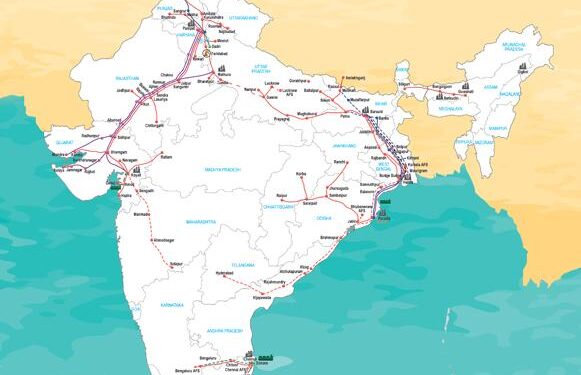New restrictions imposed by the European Union on Russian oil imports are poised to reshape global energy trading dynamics, potentially increasing Indian refiners’ dependence on intermediaries. As the bloc tightens its sanctions amid ongoing geopolitical tensions, Indian oil companies are navigating a complex web of supply chain adjustments and pricing uncertainties. Industry insiders and market analysts suggest that the evolving regulatory environment may bolster the role of crude oil traders, who act as key facilitators in sourcing and distributing Russian oil to Asia’s largest refining hub. This development underscores the broader impact of EU sanctions beyond Europe, influencing energy markets and trade flows worldwide.
New EU Russia Sanctions Shift Oil Trade Dynamics Boosting Indian Refiners’ Dependence on Middlemen
New restrictions imposed by the European Union on Russian oil exports are reshaping the global supply landscape, inadvertently increasing Indian refiners’ dependence on intermediaries to navigate complex trade routes. With direct shipments from Russia being restricted and more stringent scrutiny on transactions, many Indian companies are turning to third-party traders who specialize in circumventing sanctions or repackaging the crude. These middlemen act as crucial enablers by employing creative logistical solutions such as changing cargo documentation or utilizing multiple jurisdictions to maintain a steady flow of oil supplies to the Indian market.
The shift has raised concerns about rising transaction costs and potential compliance risks, yet for many refiners, tapping into this network remains essential to meet growing domestic demand. The dynamics have also led to a greater emphasis on private trader-led deals rather than state-to-state arrangements. Industry insiders highlight:
- Increased dependency on opaque trading structures to bypass embargoes
- Growing activity in oil trading hubs such as Dubai and Singapore
- Heightened vigilance by financial institutions to avoid sanctions violations
This evolving ecosystem underscores how geopolitical measures ripple across supply chains, impacting market access and valuation for Indian refiners relying on Russian crude.
| Aspect | Impact |
|---|---|
| Supply Route Complexity | Increased use of intermediaries and multi-leg shipments |
| Cost Implications | Higher trading premiums and insurance fees |
| Regulatory Oversight | Stricter compliance and due diligence protocols |
Impact on Supply Chains and Pricing Strategies for Indian Oil Refiners Amidst Stricter EU Restrictions
Indian oil refiners are revising their supply chain models as the European Union tightens restrictions on Russian energy imports. With direct trade flows becoming increasingly complex, refiners are expected to deepen their collaborations with intermediaries and trading firms. These traders, often possessing extensive networks and market intelligence, play a crucial role in navigating compliance challenges, facilitating cargo diversions, and managing payment channels. As a result, Indian refiners may lean more heavily on third-party traders to maintain a steady crude oil supply, ensuring operational continuity amidst regulatory uncertainties.
From a pricing strategy perspective, refiners are facing heightened volatility and need to adapt rapidly to fluctuating benchmarks and freight costs. The increased logistical hurdles and compliance risks are pushing refiners to reassess their cost structures and risk premiums. Key pricing considerations include:
- Premium adjustments to offset transportation delays and sanctions risks
- Dynamic contract terms incorporating EU regulatory changes
- Hedging strategies to mitigate price spikes linked to geopolitical developments
The following table summarizes potential impacts on notable supply and pricing parameters:
| Parameter | Impact | Mitigation Approach |
|---|---|---|
| Supply Timelines | Extended delays due to rerouting | Utilize trader networks for alternative routes |
| Pricing Volatility | Wider spreads and premium hikes | Implement flexible price formulas |
| Payment Channels | Restricted due to sanctions | Engage compliant intermediaries |
Recommendations for Indian Oil Sector to Navigate Increased Trading Risks and Secure Stable Crude Supplies
With the introduction of stringent EU restrictions on Russian crude imports, Indian refiners are poised to significantly increase their dependence on intermediaries and trading houses to secure diversified crude supplies. To mitigate escalating trading risks, companies must strategically deepen their engagement with global traders who possess extensive market intelligence and logistical expertise. Building robust partnerships and leveraging data-driven insights will be essential to navigate price volatility and fluctuating availability amid tightened geopolitical controls.
Additionally, refining capacity planning should emphasize flexibility by incorporating a broader slate of crude grades and intermediates. The table below highlights key measures Indian refiners can adopt for risk management and supply stability:
| Recommended Action | Expected Outcome |
|---|---|
| Diversify crude procurement channels | Reduce reliance on single sources |
| Enhance trader collaboration & contract agility | Improve supply chain responsiveness |
| Invest in real-time market analytics | Enable proactive risk management |
| Expand storage and blending capabilities | Maintain continuous operations amid supply shocks |
Insights and Conclusions
As the European Union intensifies restrictions on Russian oil imports, Indian refiners are poised to deepen their dependence on international trading houses to navigate the complexities of the shifting market. This evolving dynamic underscores the broader geopolitical and economic ripple effects of the EU’s policy decisions, highlighting the pivotal role of traders in ensuring supply continuity for India’s energy sector. Market participants will be closely watching how these developments influence global oil flows and pricing in the months ahead.
















